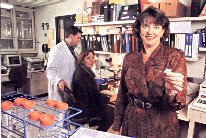RESEARCH: From Bench to Bedside
 Dr. Ann Killary, chief of the Section of Experimental Laboratory Medicine,
leads a group of scientists doing gene discovery research.
Dr. Ann Killary, chief of the Section of Experimental Laboratory Medicine,
leads a group of scientists doing gene discovery research. RESEARCH: From Bench to Bedside
 Dr. Ann Killary, chief of the Section of Experimental Laboratory Medicine,
leads a group of scientists doing gene discovery research.
Dr. Ann Killary, chief of the Section of Experimental Laboratory Medicine,
leads a group of scientists doing gene discovery research. Return to Winter 98